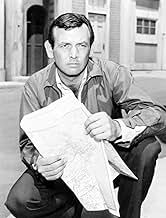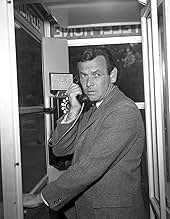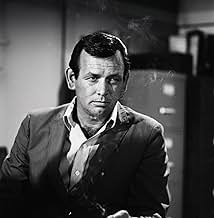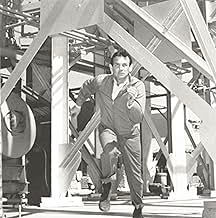After being on the run for 6 months, Richard Kimble falls in love with a beautiful woman who has a young son. She also has a physically abusive, estranged husband, that wants Kimble out of t... Read allAfter being on the run for 6 months, Richard Kimble falls in love with a beautiful woman who has a young son. She also has a physically abusive, estranged husband, that wants Kimble out of town, or dead.After being on the run for 6 months, Richard Kimble falls in love with a beautiful woman who has a young son. She also has a physically abusive, estranged husband, that wants Kimble out of town, or dead.
Paul Birch
- Captain Carpenter
- (uncredited)
Lynn Borden
- Bus Passenger
- (uncredited)
George Bruggeman
- Bar Patron
- (uncredited)
William Conrad
- Narrator
- (voice)
- (uncredited)
Dabbs Greer
- Sgt. Fairfield
- (uncredited)
Donald Losby
- Mark Welles
- (uncredited)
Rod McGaughy
- Bar Patron
- (uncredited)
Bryan O'Byrne
- Ticket Agent
- (uncredited)
Barney Phillips
- Cleve Brown
- (uncredited)
Maudie Prickett
- Miss Blaine (the babysitter)
- (uncredited)
Abigail Shelton
- Evelyn
- (uncredited)
Carl Sklover
- Bar Patron
- (uncredited)
Dick Wesson
- Introductory Narrator
- (voice)
- (uncredited)
- Director
- Writer
- All cast & crew
- Production, box office & more at IMDbPro
8.1448
1
2
3
4
5
6
7
8
9
10
Featured reviews
Fear in a Desert City 9/17/63
This classic series begins with an extended version of its eventual opening as we see Richard Kimble handcuffed to Lt. Gerard in a train, on his way to the death house, (today he'd be on his way to death row for decade or more). The train derails and we see Kimble escaping with the now broken handcuffs. Then we jump 6 months later and Kimble is in Tucson, Arizona. William Conrad's narrator, (sounding much like Mark Hellinger in the 1948 movie of Naked City), tells us it's 6 months later and describes Kimble's plight , traveling the country looking for the one-armed man he thinks killed his wife while avoiding Gerard, who is obsessed with recapturing him. "Another journey, another place. Walk neither too fast nor too slow. Beware the eyes of strangers. Keep moving."
Kimble finds a job as a bartender where he develops a relationship with a piano player (Vera Miles) and a very unwanted feud with her possessive and abusive husband, (Brian Keith). Keith is rich and influential and totally crazy, the last thing Kimble needs in his life. Miles is pretty and sensitive, which is something he does need, but scared. She also has a son who is scared for his mother. Kimble tries to leave with them but fate, of course, moves its huge hand.
I think Kimble sees in this woman and her son the family he could have had, making it particularly poignant. That's why I would like to have seen them return for the finale four years later. I would also like to have heard more of the narration from Conrad, highlighting the story and giving voice to Kimble's thoughts, instead of just describing the beginning and end of episodes, as does for most of the series.
Kimble finds a job as a bartender where he develops a relationship with a piano player (Vera Miles) and a very unwanted feud with her possessive and abusive husband, (Brian Keith). Keith is rich and influential and totally crazy, the last thing Kimble needs in his life. Miles is pretty and sensitive, which is something he does need, but scared. She also has a son who is scared for his mother. Kimble tries to leave with them but fate, of course, moves its huge hand.
I think Kimble sees in this woman and her son the family he could have had, making it particularly poignant. That's why I would like to have seen them return for the finale four years later. I would also like to have heard more of the narration from Conrad, highlighting the story and giving voice to Kimble's thoughts, instead of just describing the beginning and end of episodes, as does for most of the series.
10Guad42
A Few Observations
The plot for this first show has been well covered by others so just a couple of comments.
This episode shows three themes that will be hallmarks of this show's four-year run. First, as with all QM productions, the guest stars are always first rate. This is not only true with the main characters portrayed by Brian Keith and Vera Miles, but also the supporting characters acted out by Harry Townes, Dabbs Greer, and Barney Phillips. All were well established actors and probably cost a little more than other lesser-known performers, but QM always maintained these standards.
Second, the standard Fugitive plot device of Kimble helping out people when he would be better served to run is first seen here. Despite the bad guy have influence with the police and a deteriorating situation, Kimble doesn't run but stays and helps. We will see that about a hundred more times over four years.
Third, women falling for Kimble will be another situation we will see many times. Of course, it is created by the writers, but I give David Janssen lots of credit here. He is a likeable guy with a bit of vulnerability mixed in. If you read many of the comments made by co-stars over the years, he was a nice guy in real life too. Many reviewers, me among them, had wished the producers had brought back one of the many women that Kimble had meet along the way for the two part series finale rather than create a new character just for the ending. I had opted for Suzanne Pleshette or Janice Rule but Vera Miles would have been a great choice. Having her there at the beginning and the ending would have been nice symmetry.
A great start to a superb series. Enjoy!
This episode shows three themes that will be hallmarks of this show's four-year run. First, as with all QM productions, the guest stars are always first rate. This is not only true with the main characters portrayed by Brian Keith and Vera Miles, but also the supporting characters acted out by Harry Townes, Dabbs Greer, and Barney Phillips. All were well established actors and probably cost a little more than other lesser-known performers, but QM always maintained these standards.
Second, the standard Fugitive plot device of Kimble helping out people when he would be better served to run is first seen here. Despite the bad guy have influence with the police and a deteriorating situation, Kimble doesn't run but stays and helps. We will see that about a hundred more times over four years.
Third, women falling for Kimble will be another situation we will see many times. Of course, it is created by the writers, but I give David Janssen lots of credit here. He is a likeable guy with a bit of vulnerability mixed in. If you read many of the comments made by co-stars over the years, he was a nice guy in real life too. Many reviewers, me among them, had wished the producers had brought back one of the many women that Kimble had meet along the way for the two part series finale rather than create a new character just for the ending. I had opted for Suzanne Pleshette or Janice Rule but Vera Miles would have been a great choice. Having her there at the beginning and the ending would have been nice symmetry.
A great start to a superb series. Enjoy!
I didn't even know this show existed...nor did I realize it was on YouTube.
I was very surprised tonight when I was looking around on YouTube. This is because I found the unaired pilot episode of "The Fugitive" and while the quality of the print sure ain't great, it was well worth seeing.
When the show begins, there is an extended version of the usual opening scene from the series. This time, William Conrad went into more depth about Richard Kimble and his back story. However, you never see anything about the murder, the murderer or the trial. It starts on the train...and soon it derails and Kimble escapes the Death House.
The first plot of the show involves a woman who has a jealous, angry and violent husband. Monica (Vera Miles) plays piano at the bar where 'Jim Lincoln' (Kimble) works. While he's tending bar, a nasty man seems to be trying to provoke him. It turns out it's Edward Welles (Brian Keith)....Monica's husband. Later, when 'Jim' leaves work, he sees Edward in the parking lot beating the snot out of his wife. Naturally he intervenes and Edward speeds off in his car...nearly hitting them both. What's going to become of this poor lady...and how can Kimble help them, as he's ALWAYS out helping others throughout the series? He's sort of a wanted man and social worker all rolled into one. What makes situation tough, however, is that Edward is involved in politics and he's an important man...and he can make it really tough for 'Jim'.
This is a very good installment of the series...too good not be be seen. Perhaps the network chose not to air it because the ending is VERY dark as well as violent. Well written, well acted and a treat for fans of the series.
When the show begins, there is an extended version of the usual opening scene from the series. This time, William Conrad went into more depth about Richard Kimble and his back story. However, you never see anything about the murder, the murderer or the trial. It starts on the train...and soon it derails and Kimble escapes the Death House.
The first plot of the show involves a woman who has a jealous, angry and violent husband. Monica (Vera Miles) plays piano at the bar where 'Jim Lincoln' (Kimble) works. While he's tending bar, a nasty man seems to be trying to provoke him. It turns out it's Edward Welles (Brian Keith)....Monica's husband. Later, when 'Jim' leaves work, he sees Edward in the parking lot beating the snot out of his wife. Naturally he intervenes and Edward speeds off in his car...nearly hitting them both. What's going to become of this poor lady...and how can Kimble help them, as he's ALWAYS out helping others throughout the series? He's sort of a wanted man and social worker all rolled into one. What makes situation tough, however, is that Edward is involved in politics and he's an important man...and he can make it really tough for 'Jim'.
This is a very good installment of the series...too good not be be seen. Perhaps the network chose not to air it because the ending is VERY dark as well as violent. Well written, well acted and a treat for fans of the series.
Le Miserable
The first episode of this long-running Quinn Martin television production showcases many of the reasons why it was so successful for so long. Well-written, tautly directed and with a strong cast delivering solid performances, it was fraught with tension from first to last.
It employs the familiar QM template of breaking down the narrative to four roughly equal twelve-minute acts with a short concluding epilogue, normally to set up the next episode. Interestingly and surprisingly for this introduction and unlike the much later feature film which starred Harrison Ford and Tommy Lee Jones, there's no scene-setting opening scene. We don't see the killing of Kimble's wife, far less get a glimpse of the one-armed man he says (and I believe him!) he bumped into at the sequence. It simply starts with the train crash which separates him from his Inspector Javert-like nemesis, Barry Morse's Lt. Gerard.
Escaping to Tuscon, with a change of name and hair colour, Kimble tries to blend into the background until he can get a lead on the real killer but on getting a job as a lowly bartender, he soon gets drawn into a domestic situation involving Vera Miles' single parent pub-pianist, on the run from her jealous and violent ex-husband, played with some devilment by Brian Keith.
It ends as all future episodes must end, with Kimble losing the girl and leaving town, but not before righting wrongs and putting certain situations right and in this particular even signposting intra-marital coercive male behaviour when it was probably less highlighted than it is now.
Jansen is immediately convincing in his character and is well supported by Miles, late of major Hollywood parts , while the direction amply and skilfully draws out the story thanks to an excellent script and some atmospheric noir-esque camera set-ups.
I very much doubt I'll get to watch in my lifetime all the succeeding 119 intervening programmes until the final showdown, as I think it would take Kimble-like devotion on my part to do so, but it was nevertheless cool to check in on the very first episode of such an iconic series.
It employs the familiar QM template of breaking down the narrative to four roughly equal twelve-minute acts with a short concluding epilogue, normally to set up the next episode. Interestingly and surprisingly for this introduction and unlike the much later feature film which starred Harrison Ford and Tommy Lee Jones, there's no scene-setting opening scene. We don't see the killing of Kimble's wife, far less get a glimpse of the one-armed man he says (and I believe him!) he bumped into at the sequence. It simply starts with the train crash which separates him from his Inspector Javert-like nemesis, Barry Morse's Lt. Gerard.
Escaping to Tuscon, with a change of name and hair colour, Kimble tries to blend into the background until he can get a lead on the real killer but on getting a job as a lowly bartender, he soon gets drawn into a domestic situation involving Vera Miles' single parent pub-pianist, on the run from her jealous and violent ex-husband, played with some devilment by Brian Keith.
It ends as all future episodes must end, with Kimble losing the girl and leaving town, but not before righting wrongs and putting certain situations right and in this particular even signposting intra-marital coercive male behaviour when it was probably less highlighted than it is now.
Jansen is immediately convincing in his character and is well supported by Miles, late of major Hollywood parts , while the direction amply and skilfully draws out the story thanks to an excellent script and some atmospheric noir-esque camera set-ups.
I very much doubt I'll get to watch in my lifetime all the succeeding 119 intervening programmes until the final showdown, as I think it would take Kimble-like devotion on my part to do so, but it was nevertheless cool to check in on the very first episode of such an iconic series.
Quite Possibly The Best Drama TV Series Ever Made
While one certainly doesn't have to see the pilot it would add to the impact of the first episode. The basics: Kimball's running from a death sentence by what, indeed, the show calls "fate's big hand" which has given Kimball his escape. The running has a means to its end which is beyond surviving the wrongful death sentence. Kimball is actively looking for the real murderer, the "one-armed man" which he sees as justice for his wife and, now, his own life.
QM Productions have high standards, often inserting top-shelf actors/actresses on their way up. Here it is Vera Miles and Brian Keith. The rest of the cast is also much better than average. Of course to get by Kimball needs to hide his real identity while taking on work. He has chosen the name of Jim Lincoln. Working at a local Tucson neighborhood watering hole as a bartender makes good sense in that he can be relatively anonymous while keeping his eyes and ears open hoping for the miracle of any information on the man with one arm. We are immediately aware of Kimball's character: intelligence, humbleness, and empathy is, perhaps, his achielles heel too in a world where those possessing the opposite traits rise up. Miles plays the role of a wickedly oppressed estranged wife from her wealthy and powerful husband played by Keith. Keith is a very visible stalker seeking out his wife with no regard to the estranged nature of their separation. He is going to have her and if any one comes between that he will do whatever it takes to make sure the person is eliminated. This is exactly the kind of volatile situation Kimball doesn't need as Lt. Gerrard's constant pressure is quite palpable. Even so, the good man who is Kimball inserts himself as Mile's protector and possible love interest all while Kimball knows the later can never be.
This is the winding road beginning for Richard Kimball. One that will repeat many more times in the coming 120 episodes. What keeps it vital is the human element Kimball seems so perfect crafting. He personifies the best of humanity along with his heavy burden of constant fear. Playing this out in what almost seems like a travelog of the very different and impressive locales in the American landscape, along with memorable co-stars and characters, is the final part of a masterpiece of TV drama. In my estimation the best, if not at least, one of the top two or three TV series of all time.
QM Productions have high standards, often inserting top-shelf actors/actresses on their way up. Here it is Vera Miles and Brian Keith. The rest of the cast is also much better than average. Of course to get by Kimball needs to hide his real identity while taking on work. He has chosen the name of Jim Lincoln. Working at a local Tucson neighborhood watering hole as a bartender makes good sense in that he can be relatively anonymous while keeping his eyes and ears open hoping for the miracle of any information on the man with one arm. We are immediately aware of Kimball's character: intelligence, humbleness, and empathy is, perhaps, his achielles heel too in a world where those possessing the opposite traits rise up. Miles plays the role of a wickedly oppressed estranged wife from her wealthy and powerful husband played by Keith. Keith is a very visible stalker seeking out his wife with no regard to the estranged nature of their separation. He is going to have her and if any one comes between that he will do whatever it takes to make sure the person is eliminated. This is exactly the kind of volatile situation Kimball doesn't need as Lt. Gerrard's constant pressure is quite palpable. Even so, the good man who is Kimball inserts himself as Mile's protector and possible love interest all while Kimball knows the later can never be.
This is the winding road beginning for Richard Kimball. One that will repeat many more times in the coming 120 episodes. What keeps it vital is the human element Kimball seems so perfect crafting. He personifies the best of humanity along with his heavy burden of constant fear. Playing this out in what almost seems like a travelog of the very different and impressive locales in the American landscape, along with memorable co-stars and characters, is the final part of a masterpiece of TV drama. In my estimation the best, if not at least, one of the top two or three TV series of all time.
Did you know
- TriviaThis series was loosely based on Victor Hugo's novel "Les Miserables". The writer of this episode, Stanford Whitmore, has said that he chose the surname "Gerard" for Kimble's pursuer because it sounded similar to "Javert," who pursues Jean Valjean in "Les Miserables".
- GoofsA closeup shot of the train losing control is apparently of a toy train.
- ConnectionsEdited from The Fugitive (1963)
- SoundtracksI'll Never Smile Again
(uncredited)
Written by Ruth Lowe (1940)
[Performed at the Branding Iron bar by Vera Miles' character, Monica Welles]
Details
- Release date
- Country of origin
- Language
- Filming locations
- 7100 block of Willoughby between LaBrea and Romaine, Los Angeles, California, USA(RR tracks in ending scene with kitten and RR crossing sign in ending shot, used in ending credits)
- Production companies
- See more company credits at IMDbPro
- Runtime
- 51m
- Color
- Aspect ratio
- 1.33 : 1
Contribute to this page
Suggest an edit or add missing content



























